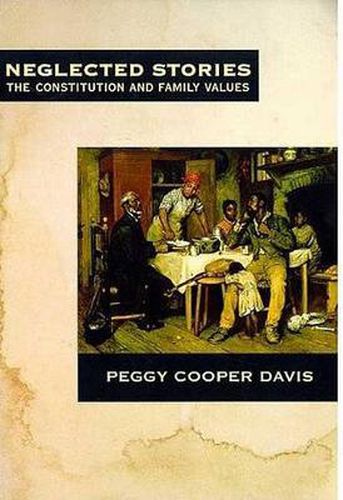Readings Newsletter
Become a Readings Member to make your shopping experience even easier.
Sign in or sign up for free!
You’re not far away from qualifying for FREE standard shipping within Australia
You’ve qualified for FREE standard shipping within Australia
The cart is loading…






In a powerful challenge to the belief that the Constitution has nothing to do with the individual freedoms that comprise family rights, Peggy Cooper Davis argues in Neglected Stories that the constitutional amendments after the Civil War reflect a profound appreciation of the political, social, and personal worth of family autonomy.
She draws upon what she calls the motivating stories of the Fourteenth Amendment to show that the Reconstruction legislators who sponsored it understood family rights as aspects of liberty that were fundamental to the proper definition of freedom and citizenship. This new understanding of family rights developed as men and women - black and white, Southerners and Northerners - came to appreciate the enormity of slavery’s denial, even destruction, of family life. Davis also explores the doctrinal stories the Supreme Court has told to justify or strike down restrictions on liberty with respect to work, marriage, procreation, parenting, and sexuality and family planning - and the stories of the litigants who wanted to live, work, marry, love, and parent as they chose.
These neglected stories are woven together in a strong new constitutional argument that gives us at long last a framework in which we can have sensible social and political debate about just what we mean when we say family values.
$9.00 standard shipping within Australia
FREE standard shipping within Australia for orders over $100.00
Express & International shipping calculated at checkout
In a powerful challenge to the belief that the Constitution has nothing to do with the individual freedoms that comprise family rights, Peggy Cooper Davis argues in Neglected Stories that the constitutional amendments after the Civil War reflect a profound appreciation of the political, social, and personal worth of family autonomy.
She draws upon what she calls the motivating stories of the Fourteenth Amendment to show that the Reconstruction legislators who sponsored it understood family rights as aspects of liberty that were fundamental to the proper definition of freedom and citizenship. This new understanding of family rights developed as men and women - black and white, Southerners and Northerners - came to appreciate the enormity of slavery’s denial, even destruction, of family life. Davis also explores the doctrinal stories the Supreme Court has told to justify or strike down restrictions on liberty with respect to work, marriage, procreation, parenting, and sexuality and family planning - and the stories of the litigants who wanted to live, work, marry, love, and parent as they chose.
These neglected stories are woven together in a strong new constitutional argument that gives us at long last a framework in which we can have sensible social and political debate about just what we mean when we say family values.